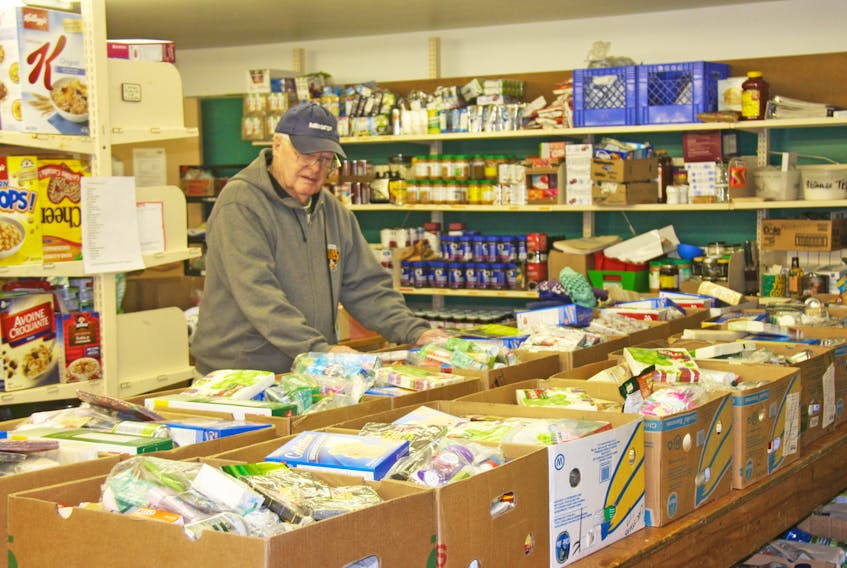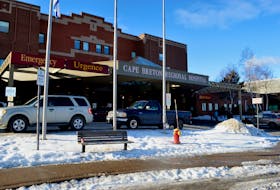ANTIGONISH, N.S. —
ANTIGONISH - Living on a fixed or lower income is a challenge for many in the Antigonish area, especially as the winter cold arrives and heating expenses rise.
Local agencies that provide assistance note demand for their services increase in the winter months.
Regular household expenses in Antigonish, while lower than urban areas such as the Halifax Regional Municipality, can stretch a lower-income budget. The average cost of renting an apartment is $932.02 each month while an average house rental comes in at 1,012.67, according to rentgorilla.ca.
Utilities for an average size two-bedroom apartment have a range of $175 to $250, according to numbeo.com. Food, transportation, phones, and other expenses can quickly eat up a paycheck or pension. And in the winter, when fuel costs rise, budgets get tight.
Food bank sees increased need
The demand for food often goes up in the winter at the food bank, according to Patricia Norman, customer service co-ordinator at the Antigonish Food Bank.
“We have a lot of families and single mothers with children. The food bank is open two days a week and customers can come in every three weeks. They get quite a bit of food when they come to us. Everybody gets basic stuff - basic dry goods, vegetables, bread, dairy, eggs, cheeses, milk, butter and meat,” said Norman.
Vegetables are seasonal and families may also receive other items that have been donated including things like laundry soap and condiments.
“Over the two weeks before Christmas, we will have 350 families who need food for the holiday season,” said Norman.
For the holidays, the food bank supplements the regular food supply with extras.
“Each family gets a turkey and a big pie and other things needed …,” said Norman.
Families and individuals must register and fill out a form to access the food bank; however, there are no income limits.
“We ask where your income comes from but we don’t ask how much. There’s no judgment. If you come to the food bank, you must be hungry,” said Norman.
“We’ve already given out more than usual. We have a lot of new families registered this year. Some people only come at Christmastime. Christmas is a stressful time for people with all the extra expenses,” said Norman.
The food bank is funded completely by donations of food and money.
“We’ve very grateful to all the people who donate. We have wonderful families who bring in produce. We get a lot of monetary donations from people in town and bequests as well. Antigonish is a wonderful place. We don’t have to organize food drives because local groups and schools and companies do it. Even children do birthday parties and ask for donations for the food bank,” said Norman.
Approximately 50 per cent of the food is purchased with monetary donations.
“Every Thursday a truck comes in from Feed Nova Scotia and we get whatever they have,” said Norman.
Emergency Fuel Fund calls have come in early
Cold winters also bring an increased cost for heating. The calls for help with fuel bills have come early and often this year, according to Mike MacDonald, chairman of the Antigonish Emergency Fuel Fund.
“We’re concerned about this year’s situation. We’ve never had to turn people away for lack of funds but we need more donations.”
The Emergency Fuel Fund was established in 2008 and targets households within the bottom 20 per cent of incomes across Antigonish County.
“To put it in context, the Town of Antigonish has about 5,000 people. This does not include university population. The County of Antigonish has about 15,000 people. Twenty per cent of the population is poor by the definition we use. About 350 households (some are families, some singles or groups of singles) fall into that lowest 20 per cent. Last year, we saw 160 households come forward for assistance,” said MacDonald.
“That’s the scale of it. A lot of our clients are single moms with kids, probably the largest group. A new and emerging group is younger people who cannot get full-time work. They may only get 20 hours or so of work. Two or three singles will pool together and rent a place and sometimes even their combined income is not enough. So they can qualify as well. The senior population need is actually getting smaller now that seniors have the guaranteed income supplement,” said MacDonald.
“One of the shocking statistics is that children constitute 20 per cent of the Canadian population, according to Stats Canada, however, they constitute 50 per cent of our population. That’s a disproportionately high number of children who are living in low income households,” said MacDonald.
The Emergency Fuel Fund is available from November until April each year.
“What we do is help clients get through the cold months. All clients are paying most of their bills but sometimes a $300 injection at a critical moment gets them over the hump and keeps the heat on. We don’t hand out money. We help some get onto budgets for a 12-month payment plan. We order and pay for oil or wood or make payments on people’s accounts for electricity. The average grant is $350 during the heating season. We want to keep people from running out of fuel,” said MacDonald.
Fundraising is a constant effort for the fund. Annual donations come from the Town and Country of Antigonish, the Sisters of St. Martha Society, East Coast Credit Union, MacGillivray Fuels, and other local groups and companies.
The St. FX faculty, officially known as the Association of University Teachers, contributes each year with a specific grant to purchase firewood needed for donations.
“We receive their grant at a time when we can place the order for all 10 loads of wood and store it where it is accessible when needed. That helps a lot,” said Mac Donald.
“Last winter we had a significant response in fundraising. This fall it’s been slower than we had hoped and we’ve had more demand,” said MacDonald
Community transit offers help for transportation
Transportation can be a costly problem for those with a low or fixed income. Housing is less expensive in the county but can leave people stranded if they don’t have a car. Antigonish Community Transit offers assistance for those who need it for medical appointments and other necessary travel.
The service consists of a fixed bus route as well as a “Book-A-Ride” service.
“This service is necessary for many people to be able to attend medical appointments, to shop, to attend the local CACL or Heatherton Group Home, to access food, and to simply be able to get out of the house for social or recreation activities,” said Madonna van Vonderen, general manager of Antigonish Community Transit.
The demand for transportation services is increasing.
“Ridership on our fixed bus route is increasing since we made some changes earlier this year. We have between 25 to 35 riders daily on the bus. There is great opportunity for growth there. Our other service is called Book-A-Ride and that service is very busy. We generally provide over 1,000 one-way rides each month with this service,” said van Vonderen.
Transportation is available daily by bus from 9 a.m. to 5 p.m. on a fixed one-hour route around town. The Book-A-Ride service must be scheduled in advance.
“Our book-a-ride service begins as early as 6 a.m. or as needed. That service must be booked by 1 p.m. the day before the service is required and is mostly used by people who live in the county and cannot access the bus route directly. However, once they arrive in town, they can then use the bus for no charge,” said van Vonderen.
“It is especially necessary for those clients who have accessibility issues. The bus is fully accessible and we have two other vehicles that are accessible as well,” said van Vonderen. Five vehicles in total are available for community transportation.
Costs are kept as low as possible to make the system affordable.
“The cost of a one-way bus ride is $2. A one-day unlimited bus pass is $5. We also offer a 20 ride pass that allows unlimited daily access to the bus for $55. Our book-a-ride service is based on distance travelled and varies for each client,” said van Vonderen.
Funding is received from the Town and County of Antigonish and from the province of Nova Scotia under the Department of Communities Culture and Heritage.
“Continued funding of the service is crucial as we cannot recover our costs from fares,” said van Vonderen.









